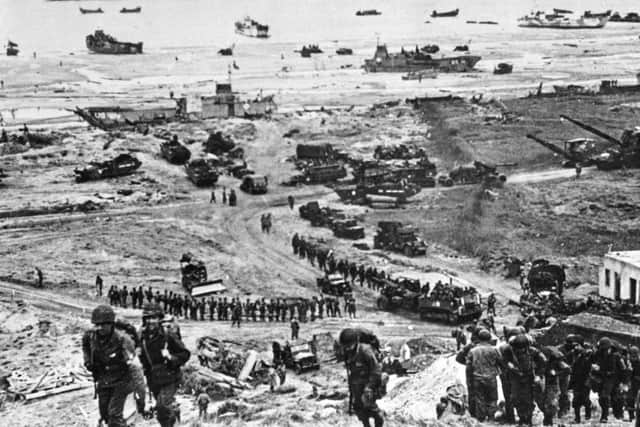Bill Jamieson: Could we muster the D-Day spirit today?
Great events do not diminish with the years but grow more resonant. One such is D-Day, whose 75th anniversary we commemorate this week. It was a heroic, astonishing and world-changing feat of arms.
Its detailed pre-planning, mobilisation, massive logistics and breathtaking bravery – the most complex and formidable military operation of all time - become all the more astonishing the more we contemplate it.
Advertisement
Hide AdAdvertisement
Hide AdIn the subsequent two months of the Normandy landings more than 60,000 British infantry were killed or wounded. Our admiration for those who risked their lives grows, not diminishes, with the passage of time.


Britain is often accused of living too much in the past, of constant invocation of the second world war and in particular the epochal events of Dunkirk, the Battle of Britain and D-Day. Films and documentaries continually revisit and re-tell them, some as a requiem – brief, fleeting episodes in a depressing self-flagellating narrative of defeatism, others coated in nostalgia for a past that was once great and for a country that has gone.
Two questions recur as we watch the remembrance ceremonies.
Would we be capable of an equivalent D-Day achievement today were we faced with a similar existential threat to our country and its values? And what might have happened had we lost on the beaches of Normandy?
The sheer numbers of the D-Day preparations alone are numbing: the vast mobilisation of weaponry, resources and personnel along the southern coast involved literally millions of people – and all this achieved in secrecy. Right to the end the Germans were deceived by brilliant feint and counter-espionage.
Could we mount a similar feat of arms today? So radical has been the transformation of geo-politics in 75 years and in the technology of war and weaponry, that to even pose such a question seems absurd.
But it does serve to expose some uncomfortable truths about our country now. We are not the homogenous, patriotic, deferential country we once were. We are diverse, multi-racial and multi-ethnic: developments that would not have been possible had Nazi-ism prevailed.
But we are also today a divided, dissonant and troubled people; trust in authority has corroded. Our institutions are under internal attack as seldom before.
Advertisement
Hide AdAdvertisement
Hide AdWe appear, in short, not as readily summonable to the dictates of conscription, the disciplines of order and service and the life-threatening hazards of front-line service.
How many would be prepared to respond – never mind trained and equipped – to respond to the call to cross the channel in rough waters under enemy bombardment and face sustained machine gun fire and shelling once we landed?
Now consider if the D-Day assault had failed: a resurgent Nazi domination of Europe, shattered morale for the Allies, prolongation of the war and calls for a peace settlement that would have left the continent facing a prolonged Nazi occupation with all its attendant horrors.
Resort to an atom bomb on Berlin, perhaps? D-Day becomes all the more worthy of commemoration when you consider the catastrophe that failure would have brought down on hundreds of millions of people.
Today the threat to our independence and way of life would take a radically different form.
What would be our response, for example, to a sudden, instant and sophisticated cyber-attack that could immobilise not only our security apparatus but also the internet, iPhone and Google?
So dependent have we become on these that it only takes a moment’s delay on our Google searches to trigger nervous panic. A national cyber-attack would create havoc within hours. Hospitals, emergency services, government services, business communication, food and product delivery, news and broadcast information would be paralysed. Successful counter-attack now would require a massive deployment of electronic and human intelligence, a repulse that would stretch our technological capability to the utmost.
And all this while preventing a civil breakdown. It would be comforting to think that we could mobilise the efforts of millions in a concerted reaction. But it is by no means clear that what we were able to summon 75 years ago could be marshalled today.